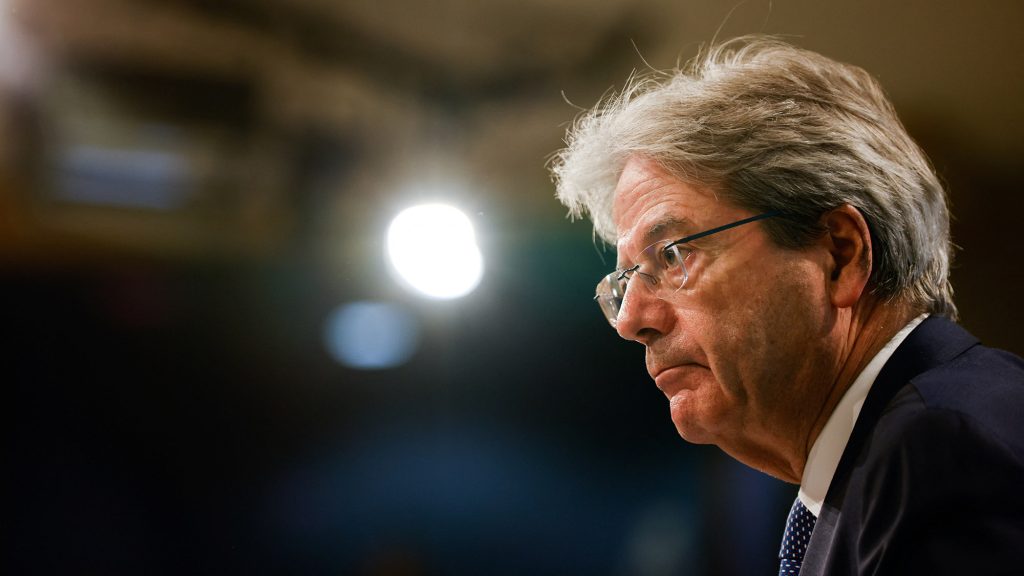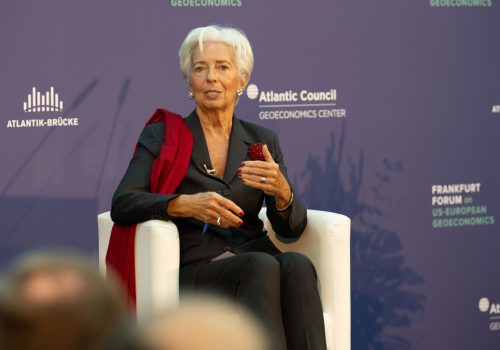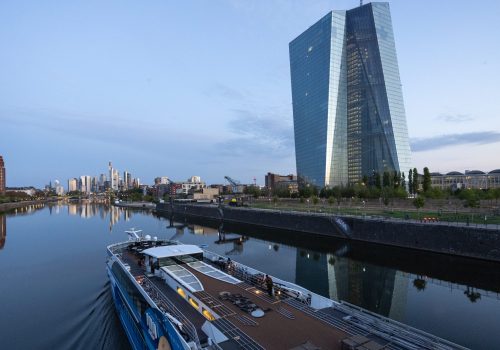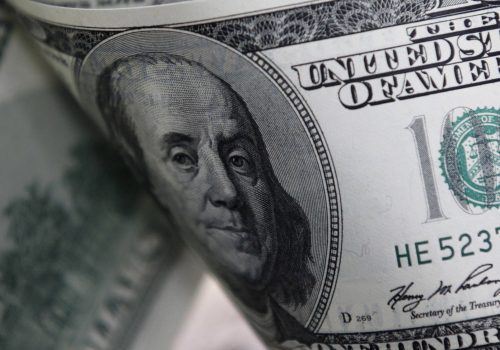Watch the full event
Event transcript
Uncorrected transcript: Check against delivery
PAOLO GENTILONI: Thank you very much. Thank you all. A pleasure to join you, and unfortunately only virtually. This is Wednesday, day of college here in Brussels.
Of course, we all know that the EU and US relations are deep, with strong ties. And after the Second World War, we always, in difficult times, we were able to stand side by side. So again, since February, we have come together to impose unprecedented sanctions against Russia, to provide crucial military and financial assistance to Ukraine, and to weaken Russia’s grip on our energy markets.
Is our common response working? In my view, definitely yes. The sanctions are eating away at Russia’s economy, which is set to shrink markedly both this year and next year. Russia’s own Federal Labor Service has stated that three thousand brands have put business on hold since the invasion, with five hundred foreign companies having been liquidated by the end of July—five hundred. Russia’s imports from the EU fell by around 50 percent in the period March-June. Russia’s imports of IT equipment have tumbled, despite its legalization of parallel imports. Blocked access to updates of Western software, absence of spare parts and semiconductors are having a grinding effect on the industry.
Many of the few cars produced in Russia—data over the summer indicated that sales were down by more than 70 percent compared to the previous year. Most of these few cars are without airbags and catalytic converters.
Russia’s share on EU gas imports has fallen by two-thirds, from 45 percent before the war to 14 percent now. And its share of our pipeline gas imports has fallen by three quarters, from 40 percent to 9 percent. The deals that we have struck with the US and other partners to boost energy imports have made up for the cuts in Russian fossil fuels.
I am mentioning these figures because I think we need always to repeat how successful was our common effort to respond to the Russian invasion with economic sanctions. And now the cap on the price of Russian oil exports that was agreed in principle at G7 level and was mentioned in the previous panel will put downward pressure on global energy prices and reduce the Kremlin’s ability to fund the war. And today we are setting out the legal basis to implement these key measures in the EU.
So overall our common response is working. And I have to say that Russia’s recent moves, from halting gas deliveries to the mobilization of their reservists and sham referendum, are clear signs of weakness and growing desperation. Of course, they are also sign of escalation, which we are responding with other packages, the eighth sanction package that was just announced by President von der Leyen here in Brussels.
On the economy, it’s clear that the consequences of the war are weighing on economic prospects on both sides of the Atlantic. A combination of high energy price, high inflation, monetary tightening, and uncertainty are putting a damper on growth. Both EU and US will see positive growth for the year 2022 as a whole, but all the signs are there of a slowdown. And a recession can no longer be ruled out. We are entering the phases of stagnation and possible recession.
So, to ensure—to navigate in these troubled waters, we need to maintain our responsible fiscal policies and at the same time our efforts of investments. For Europe, the NextGenerationEU remains the strongest common tool at disposal, and this is why I have made clear that while we are open to discussing limited and specific points, there should be no wholesale re-opening of plans of recovery or postponing of key commitments.
In this context, let me conclude these remarks with three lessons or priorities for the future of our transatlantic relations. First, of course, our strength lies in our unity. Within the EU—and you know how challenging it is to keep our unity with our likeminded partners across the Atlantic and beyond. In the months ahead, this unity will be tested again and again, and we must stay the course.
Second, in an increasingly multipolar world, the EU and US must continue to work together every day—and not just in times of crisis—to show that liberal democracies can deliver sustainable and inclusive growth, and this is happening. I think that the arrival of the Biden administration marked a qualitative improvement in these multilateral relations.
Our agendas are very much aligned. In Europe, we are pursuing an ambitious part of investments and reform to deliver on the triple transition—the green, the digital, and the social. I think that the Inflation Reduction Act in the US goes in a similar direction. As you know, we are also looking more broadly on how our fiscal roles can better support investments in crucial areas while making sure that level remains sustainable, and we will present our proposal in this next month.
Going forward, there is also hope to strengthen our trade cooperation knowing that the disruption to global supply chain must galvanize us to build safer, more resilient supply chains—especially in strategic sectors—but this doesn’t mean in any sense going to protections.
Third and last lesson, transatlantic cooperation is necessarily but not sufficient condition to tackle the challenges ahead of us. For that, we need to master much wider coalitions.
Russia has openly challenged the rule-based international order. This is not a Western order. It’s an order that is in everyone’s interest to uphold. Yet, thirty-five countries, as you know, including three members of the G20, decided to abstain in the U.N. resolution condemning Russia’s invasion of Ukraine.
So, we have to increase our reach out and influence in other parts of the world. This is the key objective for the EU of the Global Gateway Strategy to mobilize… investments across the world, in line with the G7 Partnership for Global Infrastructure.
We also need to work for a more effective multilateralism. There’s a great example that we have now to implement. It is last year’s global agreement to reform our global corporate taxation—an agreement that was made possible because everyone worked in a spirit of compromise to find a common solution. And I’m confident that this spirit will lead it too, and this spirit is alive and can guide us in meeting the common challenges we face.
So, thank you very much for this opportunity, and I’m happy to answer your questions.
ANNETTE WEISBACH: Commissioner Gentiloni, thank you very much for your deliberations. Let me, first of all, ask you about what happened today in Brussels because clearly President von der Leyen has presented a new round of sanctions, a package, and also news on potential oil price caps. Perhaps you can give us the latest what’s discussed in Brussels.
PAOLO GENTILONI: Yes. Indeed, we are working on the eighth package of sanctions. The main aspects of this package of sanctions are probably three. The first, we increase our listing of Russian persons or entities. They are now up to 1,025 persons, and seventy Russian entities. And this is the first part. The second part will be increasing of trade limits towards Russia. And the third, that I heard mentioned in the previous panel, is the agreement of G7 level on the price cap of oil.
Of course, this means that we will work especially on the sector of the shipment insurance to make sure that there is an agreement to avoid contracts, if oil is transported at the higher price in relation to the cap that we will establish at G7 level. As always, the decision making in the European Union is a process. We don’t have executive orders. But I am quite confident that, again, this new package of sanctions will be supported by member states and will enter into force.
ANNETTE WEISBACH: What do you think—when will those price caps, also for the energy of electricity and gas market, will get implemented and so consumer will finally benefit from it? Because we’re heading into the winter period.
PAOLO GENTILONI: Well, of course, we worked a lot in the previous months. And indeed, there were metrics and figures in my remarks, also to remind myself and everyone of how much we were able to achieve in these few months. If you look at the fact that we go from 40 to 9 percent, and maybe we are now even less than 9 percent, about gas coming from Russia. This is quite substantial. You know that we have very high level of storage.
We are working on mandatory savings among member states, of course, with different ways of reaching these mandatory targets. And next Friday, the Council of Ministers of Energy will address the—also not only these issues, the issue of solidarity contributions, the so-called price limits… but also the issue of a price cap on gas. I’m sure that this discussion will be, as always, with different opinions. And I am confident that Friday will put the basis for a final agreement in October in the European Council to introduce a limitation of price for gas.
My final remark is, we should, I think, avoid raising expectation of the fact that these price limits will automatically bring energy prices to a pre-war situation. It will be a gradual process, but it’s very important to start this process of limiting these prices.
ANNETTE WEISBACH: Let me also ask you about the cooperation between Europe and the EU and the United States, because clearly we are here at the Atlantic Council. So how is cooperation going, and how confident are you that perhaps there might be more LNG deliveries from the US into Europe?
PAOLO GENTILONI: One, we had a very important agreement—President Biden and President von der Leyen a few months ago agreed on supply of LNG. Of course, when we refer to capping prices of gas, we are referring mainly to gas reaching the Union—the European Union through pipelines. And of course we are not putting at the same level Russia and Norway, or Algeria, or Azerbaijan because, of course, with Russia we have a double intention to keep the prices—to limit the prices but also to undermine the war machine of Russia.
Different is the situation for LNG, where we will cooperate with our partners and with the US both on supply and possibly on making differences of prices for European and Asian markets less dangerous than the one that we are seeing now. By the way, this difference between the Asian and the European market on LNG is changing months per months, so I think we have to address this issue with our partners. This is a different story from the capping of gas and from the pipelines.
ANNETTE WEISBACH: Aside from that energy crisis we are currently facing, there has been also political developments in the EU, which at least is interesting, also for an international audience. The election outcome in Italy—I know you are also from Italy, so it might be a bit tricky for you to answer that question, but I’ll at least try and ask it.
So what do you think will be the ramifications from the outcome of the elections in Italy?
PAOLO GENTILONI: Well, the—of course I have a conflict of interest, so I have to—once we are questioned as European Commissioner—
ANNETTE WEISBACH: Yes.
PAOLO GENTILONI:—not as a former Italian politician.
As European Commissioner, I would simply say that we are of course ready to cooperate with the old governments, including the coming Italian government. Now, of course, I could add that, as the Latin motto goes, “pacta sunt servanda.” So we have a very important cooperation on the recovery, and we have our common rules. You know that these common rules, by the way, are under review and discussion, and what we ask of all European member states is give their contribution, to have their view, but to stay to the facts that are ruling our union. I am confident that this will be the case also for Italy, and we are ready to cooperate…
Watch the full event
Further reading
Wed, Sep 28, 2022
ECB chief Christine Lagarde: ‘Our primary objective is price stability’
New Atlanticist By
Europe's top banker shares her thoughts on the inflation crisis and much more during the Atlantic Council's Frankfurt Forum.
Tue, Sep 27, 2022
From sanctions to digital currencies, here’s a new transatlantic agenda for economic coordination
New Atlanticist By Charles Lichfield
At our Frankfurt Forum on US-EU GeoEconomics, the Council's original research lays out a long-term strategy for economic coordination in a world reshaped by Russia's invasion of Ukraine.
Thu, Sep 22, 2022
The dollar has some would-be rivals. Meet the challengers.
New Atlanticist By Ananya Kumar, Josh Lipsky
What are the realistic alternatives to the dollar that US and allied policymakers should be paying attention to? And how can they respond?
Image: European Commissioner for Economy Paolo Gentiloni attends a news conference on the EU Commission quarterly economic forecast in Brussels, Belgium, July 14, 2022. Photo via REUTERS/Johanna Geron.




